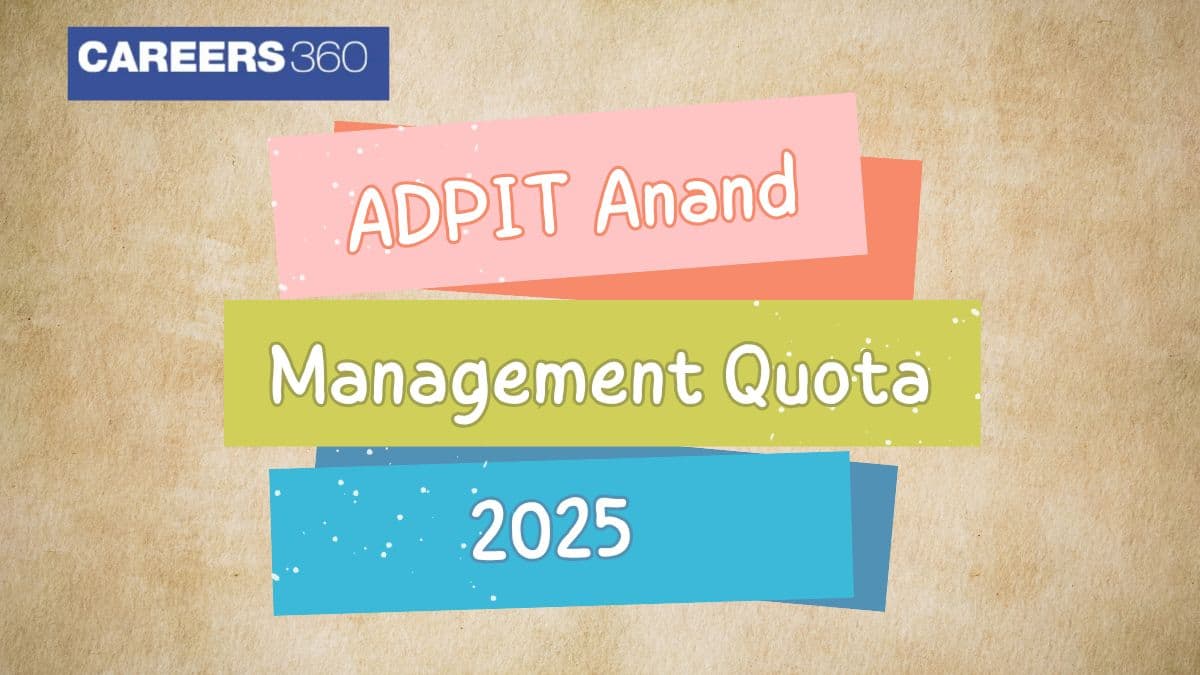MIT World Peace University B.Tech Admissions 2026
Highest CTC 44.14 LPA | UGC Approved | 1600+ Recruiters | 100% Placement
ADPIT Anand Management Quota 2025 - AD Patel Institute of Technology (ADIT), Anand is a well-regarded private engineering college in Gujarat. In addition to standard admissions via GUJCET or JEE Main through ACPC, ADIT also offers management quota admissions. A percentage of BTech seats offered at ADPIT Anand are reserved for management quota, while the rest are allotted via the regular centralized admission process.
This Story also Contains

The management quota route does not require an entrance exam, though students with GUJCET or JEE Main scores are often given during seat allotment. Applicants must still satisfy the minimum eligibility criteria; passing 10+2 with at least 45% aggregate in Physics, Mathematics, and Chemistry/Biotechnology/Biology. The tuition fee under management quota is generally higher and ranges between Rs. 4,00,000 to Rs. 6,00,000 per year . Read this article to understand the seat intake overview, eligibility, fee structure, and admission process for ADIT Anand management quota 2025.
ADPIT, Anand offers approximately 1000+ B.Tech seats across 10 branches, which include Computer Engineering, Civil Engineering, Mechanical Engineering, Electrical Engineering, Electronics & Communication Engineering, Information Technology etc. Below is the curated seat intake via management quota under respective entrance exam or seat type.
Management Quota 2025 Seat Intake
B.Tech Course | Management Quota Total Seat Intake | ||
JEE Main | GUJCET | NRI | |
6 | 36 | 18 | |
3 | 18 | 9 | |
1 | 9 | 5 | |
9 | 54 | 27 | |
5 | 27 | 13 | |
1 | 9 | 5 | |
1 | 9 | 5 | |
3 | 18 | 9 | |
5 | 27 | 13 | |
9 | 54 | 27 | |
Other Related Links
Check the eligibility criteria below, candidates need to qualify the following criteria for taking admission through management quota in ADIT Anand.
ADIT Anand Management Quota Eligibility Criteria
Perticulars | Details |
Academic Criteria |
|
Entrance Exam Criteria |
|
Also Check:
Below is the course wise fee for B.Tech admission through management quota in AD Patel Institute of Technology. Tuition fee for management quota is generally a bit higher than normal entrance based admission.
B.Tech Course | Tuition Fee |
Artificial Intelligence And Data Science | Rs. 4,88,000 |
Automobile Engineering | Rs. 4,88,000 |
Civil Engineering | Rs. 4,88,000 |
Computer Engineering | Rs. 4,88,000 |
Computer Science & Design | Rs. 4,88,000 |
Dairy Technology | Rs. 4,88,000 |
Electrical Engineering | Rs. 4,88,000 |
Electronics & Communication Engineering | Rs. 4,88,000 |
Food Processing Technology | Rs. 4,88,000 |
Information Technology | Rs. 4,88,000 |
Contact the ADIT campus admissions office - management/NRI seat details are provided via the official website.
Obtain and fill the application specifically for management quota seats.
Submit academic documents (10+2 mark sheet, ID proof) and report GUJCET/JEE Main scorecard if available.
Pay the required fee to process the application.
Wait for merit or selection list to be released by ADIT’s admissions cell.
On selection, complete document verification and pay the tuition fee to confirm admission.
Below is the list of documents needed to be submitted at the time of admission.
Marksheets and certificates of all previous examinations
Entrance exam score cards
Character certificate
Transfer and migration certificates
Caste certificate (if applicable)
DOB certificate
ID proof
Other Related Links:
Frequently Asked Questions (FAQs)
Yes, ADPIT admits students via ACPC counselling based on GUJCET/JEE Main scores and qualifying exam performance. The cutoff for these seats can be competitive, making management quota an easy alternative.
The regular B.Tech fee is Rs. 4,88,000. Management quota fees are higher; exact figures might differ at the time of admission.
Candidates must pass 10+2 with 45% or above in PCM (40% for SC/ST). GUJCET or JEE Main score is preferred but not mandatory.
On Question asked by student community
Hello Student,
A.D.Patel institute of technology,Anand,this institution has very big and lush green campus.
Automobile Engineering,Civil Engineering, computer Engineering,Electrical Engineering,Electronics and communication Engineering,Food processing Technology,Mechanical engineering,information technology,etc
A.D patel institute of technology offers these 8 BE courses, also other 6 post graduate courses under ME and all these courses are
Hi Vatsal,
The placement scenario of ADIT is not that good as the highest package offered here till now is around 12 lpa and the average package offered is aroun 3-3.5 lpa and the lowest package offered is 2 lpa. Some of the top recruiting companies were Amazon, Cybage, Capgemini,
Among top 100 Universities Globally in the Times Higher Education (THE) Interdisciplinary Science Rankings 2026
Recognized as Institute of Eminence by Govt. of India | NAAC ‘A++’ Grade | Upto 75% Scholarships
Among top 100 Universities Globally in the Times Higher Education (THE) Interdisciplinary Science Rankings 2026
70th University Ranked by NIRF | 80th Engineering Rank by NIRF | Accredited by NBA and NAAC A+
Last Date to Apply: 26th March | Ranked #43 among Engineering colleges in India by NIRF | Highest Package 1.3 CR , 100% Placements
Apply for UG & PG programs from Victoria University, Delhi NCR Campus